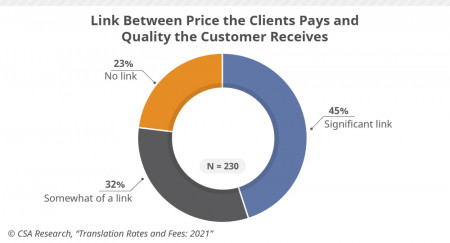The Future of Pricing Models as Translation Transforms From Computers-Aiding-Humans to Humans-Aiding-Computers

BOSTON, February 22, 2021 (Newswire.com) - Per-word pricing as the fundamental pricing strategy for the language industry is under review as translation transforms from computers-aiding-humans to humans-aiding-computers. Word-counts are less of a simple measure of effort when the variables are not only the time and expertise of the linguist, but also the efficiency of the various forms and augmentations to machine translation (MT), translation memory (TM) lookup, workflow, and business processes enhanced by artificial intelligence (AI) and machine learning.
Will translation follow the lead of industries like marketing and music that changed their pricing models to survive and continue delivering what the buyer wants? Or will it follow approaches inspired by Uber and other gig-economy entrants? When purchasing or selling translation services, there are many considerations in addition to the per-word rate.
Based on interviews and surveys with 563 buyers of language services from 27 countries and with 430 LSPs in 63 countries, independent market research firm CSA Research has released a series of reports dedicated to pricing and procurement strategies for both buyers and vendors of language services.
"Competition in the language services market is ruthless. LSPs can always find competitors that are willing to undercut their rates. At the same time, though most buyers of language services view translation and interpreting as commodities, they still invest time and effort when choosing vendors and negotiating fair rates," comments Alison Toon, senior analyst, CSA Research. "The reports in this series present insightful data to help buyers of language services evaluate their purchasing strategy and alternative methods for buying language services while providing LSPs with the tools and data they need to develop and grow their services and identify ways to help their clients optimize processes."
Reports included in CSA Research's translation pricing and procurement series:
- Translation Rates and Fees: 2021
- How Popular are Per-Word Pricing Models?
- Procurement: Friend or Foe?
- Managing Multiple LSPs for Global Brand Support
- What Buyers Think About LSP Pricing Models
- How to Engage Global Procurement as Your Ally
- How to Win the High-Stakes RFP Game
- The Future of Language Services Pricing
- LSP Pricing Strategies
The reports are part of CSA Research's syndicated research membership. For more information, visit csa-research.com.
About CSA Research
CSA Research, formerly Common Sense Advisory, is an independent market research company helping companies profitably grow their global businesses and gain access to new markets and new customers. Its focus is on assisting its clients to operationalize, benchmark, optimize, and innovate industry best practices in globalization, internationalization, localization, interpreting, and translation.
Source: CSA Research